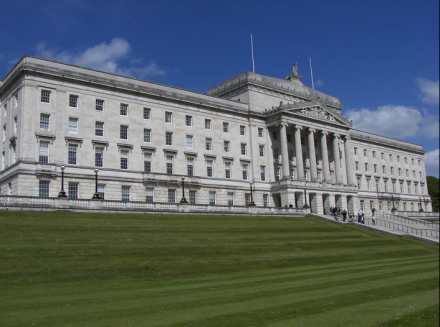
Northern Ireland continues to make headlines these days, and I have become the unofficial Northern Ireland correspondent to my friends and colleagues who are keen to understand more about that neglected part of the United Kingdom. Despite its recent prominence, however, I continue to be frustrated by the widespread lack of understanding, and often the lack of will to understand.
A couple of years ago, few of my English friends were aware that Northern Ireland did not have abortion access or equal marriage. Thanks to some amazing campaigns, and the work of MPs such as Stella Creasy, these issues have become part of normal discourse on the left. While I am grateful, these are eye-catching stories around issues that most on the left can unite around. We debate and disagree on how to reach the solution, but there is a consensus that a solution must be reached. These issues are easy to talk about.
Less easy to explain and discuss are the systemic failures in Northern Irish politics. Lack of abortion access and equal marriage are the symptoms of a much wider problem. Stubborn politicians from both communities cling to power or ideology at the expense of progress.
The DUP have revealed themselves time and time again to be what Northern Irish people would call ‘thran’: fiercely stubborn in the face of all and any facts that might contradict their worldview. This was made spectacularly clear in the recent scandal involving Ian Paisley Jr, who has been suspended from the DUP and is facing the first ever official MP recall petition. But even if the petition is successful, Mr Paisley has vowed to run again. And with his 20,000 majority and the continued backing of the DUP during his suspension, he is likely to win.
This doesn’t mean that the people of North Antrim like or agree with Ian Paisley, although many do. Politics in Northern Ireland is polarised and has become more so following the last general election, when neither the Social Democratic and Labour Party (SDLP) nor the Ulster Unionist Party (UUP) managed to win a seat. Many vote with a tribal mentality to keep ‘the other side out’. If you don’t want Sinn Féin to win, you have to vote DUP, and vice versa.
The politicians know this, and all dance to the tune of a sectarian dog-whistle. Their confidence also comes from the fact that they know Westminster will not get involved, and any threat to their power and control over their respective communities is empty. This is particularly the case with a Tory leader in a deal with the DUP and a Labour leader who has historically backed Sinn Féin.
The very reason the Tories sistered with UUP and Labour sistered with SDLP was to avoid this polarisation and intense sectarianism in Northern Irish politics. The idea was that the Westminster parties could encourage the more moderate elements in politics to work together – yet this seems to be all but abandoned.
Northern Ireland was set to break the Guinness world record for the country without a government for the longest period in peacetime on 28th August 2018. However, while protests have been arranged for that day, Northern Ireland has been told it cannot qualify. This is because it is still eligible to have laws passed at Westminster.
It is galling for me as a Northern Irish person that the Guinness Book of Records has a better understanding of the central UK government’s responsibility to Northern Ireland than Westminster does. This was made all too clear during the recent debate on repealing the Offences Against the Person Act. I welcomed the fact that many MPs were beginning to understand their responsibility to guarantee the rights of all in the UK, but I was sorely disappointed as it became clear that while Northern Irish women had Westminster’s sympathy, they would not be granted the protection of their laws.
This all becomes much more complicated with the issue of Brexit and the Irish border. Everyone wants to find a solution, but no one is prepared to look for one, or admit that there may not be one. I’ve written before about how creative solutions are needed. They will not be found until all stakeholders can sit around a table, rather than make snide remarks about each other in the press.
Politicians from all communities have failed the people of Northern Ireland. Westminster has failed them, largely through inaction. There has been a failure to take any adequate action to solve the current political vacuum, a failure to create vital human rights protection, and a failure to see the people of Northern Ireland as equals in this union. Recent polling has suggested that Brexit could sway Northern Irish opinion on reunification with Ireland. If Westminster does in fact value the union, action must be taken quickly and meaningfully – before it becomes a question of ‘when’ rather than ‘if’.
Charlotte Norton is a lawyer and editor of the Young Fabians magazine Anticipations. She is from Coleraine in Northern Ireland.




More from LabourList
‘The High Court judgment brings more uncertainty for the trans community’
‘There are good and bad businesses. Labour needs to be able to explain the difference’
‘This ruling should now remove any remaining barrier to approval of EHRC code’